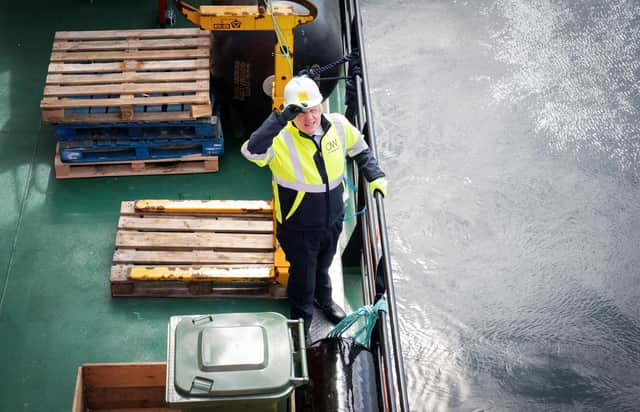Sensible things Boris could have said, but didn’t – Brian Wilson


Apart from being politically foolish, it was historical nonsense. Closing Britain’s coal mines did not lead to reduced reliance on coal over the next couple of decades. It just led to reliance on imported coal.
The growth in renewables since the turn of the century has helped kill off coal as a generator of electricity - absolutely nothing to do with the Thatcher legacy. But the wider issue of fossil fuel dependency remains, with imported gas now our staple of choice. Is that acceptable?
Advertisement
Hide AdAdvertisement
Hide AdIf Mr Johnson wanted to offend anyone, he might have pointed his verbal dexterity in the direction of his hosts. Lovely windfarm, he could have said, but also an outstanding example of what must never happen again – i.e. the fact that virtually every bit of it has been imported from around the globe.
That would have been a good, forward-looking message because it is one on which tens of thousands of future “green jobs” depend. As history teaches us, rhetoric guarantees absolutely nothing.
In Scottish waters, the licences are being handed out by Crown Estate Scotland and they will pull in huge amounts of money. Some Crown Estate Scotland revenue profits go to the Scottish Government but some are kept by the Crown – in 2019/2020, this amounted to £1.8 million, or 13 per cent of the total – so there are strong vested interests.
I find the continuing involvement of the Crown Estate extremely odd. There may well be a conflict between maximisation of revenue from these licences and the wider social and economic interest. The Crown Estate should have no role in determining that balance.
The formula adopted is equally unsatisfactory. This time round there are to be declarations sought from licence applicants about their intentions in relation to supply chain and local content. If they are granted the licence and fail to meet what they promised, there will be some unspecified sanctions.
However – and it is a very big however – the bit in the middle is missing. The commitments made will play no part in determining who wins the licences. Money will undoubtedly be the prime determinant of that – and so consortia with zero obligation to provide jobs in Scotland or elsewhere in the UK may well end up as successful bidders.
Mr Johnson could have used his visit to say that he will make it his business to ensure (with the Scottish Government presumably agreeing) that no consortium of oil giants, energy behemoths or other current supplicants, will get a licence without bankable commitments to UK industry. That would really have been worth saying, even if his hosts shuffled uncomfortably.
He would also have been entitled to point out that little of this is actually going to happen until near the end of the decade. Two lessons could be drawn. First, the intervening period must be used to put in place the infrastructure that will be required , particularly around ports, to maximise the benefits from these vast projects. What better use for the new structural funds, across the UK?
Advertisement
Hide AdAdvertisement
Hide AdThen he could have disputed the fashionable folly of turning the North Sea oil and gas industry into some kind of ogre which should not be mentioned in polite company until it can be got rid of altogether. How times change! The fact is that at least 200,000 jobs depend on it and until there is certainty about what is to be put in their place, ca’ canny about destroying other people’s livelihoods.
A quite rapid energy transition is taking place and should be encouraged but virtue signalling at the expense of what is still an extremely important employment sector is an act of self-harm. The run-down of oil exploration and extraction can only sensibly be managed on an international basis and unilateral actions are pointless.
There are a lot of useful things Boris Johnson could have said on his visit to an offshore windfarm but I don’t suppose they would ever even have occurred to him. So say something daft instead.
This article previously stated that Crown Estate Scotland revenue profits pass to the Scottish Government. The Crown keeps a variable proportion of those profits each year, as directed by Scottish Ministers; for example, in 19/20 that amounted to £1.8m, equal to 13% of total net operating profit.
This article previously stated that 25 per cent of profit from ScotWind licence agreements goes to the Crown. However, Crown Estate Scotland revenue profits pass to the Scottish government with the Crown keeping a variable proportion of the sum each year as directed by Scottish ministers; for example, in 2019/20 that amounted to £1.8m, equal to 13 per cent of total net operating profit.
